Source:
Bridgwwinners
Today I have a different type of topic:
Tempo at the bridge table. We have all read articles urging players to bid in an even tempo to avoid creating ethical dilemmas. That is true and good as far as it goes, but none of these articles explain the real reason to bid in tempo:
Some of your opponents are vacuum cleaners. These guys suck in and process tiny nuances. Want names? How about these: Mike Lawrence and Fred Hamilton.
Mike once gave me an opening lead problem after an uninformative auction to 4M. There was an ace in the other major and a trump looked wrong so it was clear to attack a minor, but the minors were

Q9xx and

Q8xx. If I led the wrong minor, I would blow a trick and probably the contract. Seconds ticked by as I searched for an inference to guide my choice. Finally finding no clue, i said, “I lead a diamond, I guess,” and waited nervously to hear whether I had blown the contract.
Mike didn’t answer me. He said my reaction to the problem was typical. Everyone tries to find some hint, eventually gives up and makes their best guess. he went on. “When hands like this occur at the table, an honest player awaits the dummy nervously fearing he has blown the hand.” Mike declared this hand. At the table, the opening leader had studied his cards earnestly before choosing a lead but when dummy hit, he was completely relaxed. Why?
Because he already knew he had made the right lead. You see, his partner had illegally signalled to him the correct minor to lead. The cunning cheater faked the tank an honest player makes but he couldn’t suppress the relaxed feeling of knowing his lead was the right one. That absence of anxiety clued Mike to the fact this pair was dishonest. The partnership was eventually caught and Mike’s suspicions were vindicated.
If you see Fred Hamilton at a bridge tournament, you can ask him to play a game with you. The game works like this. You flip a quarter and conceal it from Fred. Then you peek at the quarter and say either “heads” or “tails”. You don’t have to tell the truth of course. Fred will then tell you whether the coin is heads or tails. At the beginning he may get it wrong, but after a few trials Fred is rarely, if ever, wrong. Fred can spot your tells to know when you are lying.
These guys are tough enough to play straight up. The last thing you need to do is give them an extra edge with an inopportune tank to tell them:
- when you do and don’t have full values
- when you are setting a trap for them to balance into,
- when you are overeager and can be pushed into bidding one more, etc.
Of course, that is well and good for me to say, but many bidding decisions are difficult. How is one supposed to bid in even tempo when some decisions are tougher than others? Here are some tips to bid in more even tempo.
Tip 1. Slow down!
If you ever get the chance, kibitz Eddie Wold for a session. Not only is Eddie among America’s finest players, but he has virtually
perfect tempo. Every call, even an automatic final pass occurs at the same deliberate pace. He masks his hard decisions by slowing down the automatic ones.
Slowing down has other non-obvious benefits. It helps one feel calm. Eddie’s face is a relaxed and emotionless mask. No one can tell whether he expects -1400 or +1660 in his doubled slam.
The extra time you take by slowing down the auction can be put to good use. Spend it thinking about how the auction might develop. Which call by partner or an opponent will be most difficult to handle? What will you do if that awkward bid happens? Eddie is relaxed because he is almost never surprised as a result of using his time well.
Tip 2. Use the other guy’s tanks
Opponents and partners sometimes need to tank. When they do, you can use that time to think about your next call. For example:
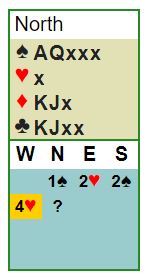
RHO tanks for 30 seconds before bidding 4

. You may or may not think your hand is worth 4

now. Regardless of your evaluation, you should be able to make your next bid in tempo. While you couldn’t know for sure what RHO was about to bid, holding a stiff heart, it surely had to be a heart raise. 30 seconds is enough time to plan your call over several bids: 3

, 4

, 3

or even a 4m splinter. When it is your turn, be ready to bid in tempo. In top bridge play, you virtually never see:
LHO: <long tank> normal bid
Partner: <long tank>
Time is precious. Top events are often played under time pressure. You will soon be hearing caustic comments from your opponents if you are a time-waster, daydreaming about the steak you had at dinner last night while your RHO is thinking,
Tip 3. Learn your system
Players are often slow when they are unsure what partner’s bid means or what their own responses mean. When this happens to you, make a note of it. After the session, research the auction (for example by asking a question on this site!) or discuss it with partner. Reducing holes in your system knowledge will reduce the guessing you do in many auctions.
In some auctions, it is just a matter of memorizing a list of responses. In other, more complicated areas, you need to define general principles instead. For example, take forcing passes. You can not easily make a list of all auctions where a pass is forcing, and even if you did, it would be pages long and stultifying to read.
Here are some examples of complicated areas best handled by general principles:
- When is a pass forcing?
- In competition, when is 2NT artificial and when is it natural?
- When is 3NT a serious slam try in a major and when is it not?
For questions like these, you need a list of criteria such as this partial example:
1. When responder makes a
game-forcing raise, pass is
forcing.
2. When responder makes a
limit raise or better, pass is
forcing at the 5-level.
3. When responder makes a
non-forcing raise, pass is
forcing if opener shows extra strength by
bidding a new suit or
cue-bidding on the way to game.
Tip 4. Count your points before you sort your hand
This is an odd one, but i have found it extremely helpful. When you remove your hand from the board and spread your hand, count your points before sorting. While you are sorting, you can begin your thinking process early. I was surprised how useful the additional few seconds of thinking time was to me. It allows me to get my bids on the table briskly. For example, if I count to 20 HCP, I can get my 2NT opening out on the table as soon as I can see my pattern is balanced. Give it a try and you will see what I mean.
Tip 5. In constructive auctions, anticipate awkward rebids.
Bad tempo can often be traced to
waiting until the final moment to make critical decisions. Ever been in a position like this one?
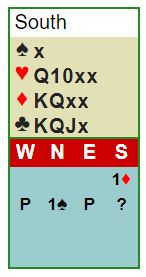
Darn–partner bid spades not hearts or clubs, I’d know what to do then. Now should I rebid 2

? Could 1NT be better? ummm… tick-tock, tick-tock.
After a slow 1NT the opponents will know there is something unusual about your hand. If partner’s spades are

Jxxx, that may be just the clue they need to find a spade lead.
Avoid this break in tempo by planning your auction before you open. As a general rule, the most difficult continuations occur when partner responds in your shortest suit. These are also the most common responses partner will make. So before you open, ask yourself what you will rebid if he bids 1

? Make that decision before you open. Whether you choose 1NT or 2

, your call will be in tempo.
Planning your rebids in advance also reduces anxiety. An offbeat bid like 1NT with a singleton may create some anxiety. That anxiety will be magnified when the moment to make the call arrives and you sense the seconds passing and everyone staring as you struggle to make your decision. If you are anxious, not only will your bid be slow, but your face and manner will reflect your nervousness, further communicating that there was something odd about your bid. So planning your auction will not only improve your tempo, it will allow you to make your bids without giving as many signs of emotion.
Incidentally, adopting this habit may cause you to make better choices about opening,
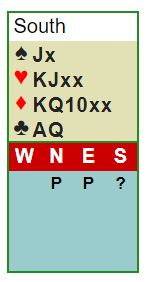
Your first thought is to open 1

. But ask yourself what will you rebid if partner responds 1

? With 16 points a 1NT rebid is an underbid but a 2

reverse is too much with this soft hand. Perhaps you should sidestep the rebid problem by opening 1NT instead.
Tip 6. In competitive auctions, anticipate further bidding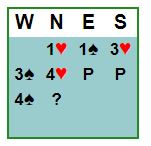
What now? Opponents bid 4

in this auction so frequently, that players joke they are “accepting the transfer” when they bid 4

over an opposing 4

. Before you bid 4

, consider what you will do over the likely 4

bid.
Considering the 4

call in advance, may make you choose another call. If you are certain you are bidding 5

over 4

and you think 4

may make, perhaps a direct 5

is better than 4

. If you are not sure whether it will be right to compete to 5

, perhaps you should solicit partner’s opinion. Bid 4m instead to tell partner where your side-suit values lie so he can help in the final decision. And of course if you know you will double 4

, then bid 4

and double when they give you the opportunity.
As a general rule, when you are short in a suit bid by the opponents, prepare mentally for further competition in that suit. When you have a flat hand, the risk of further bidding from the opponents is smaller.
Conclusion
Almost all expert players bid with excellent tempo, especially in routine auctions.
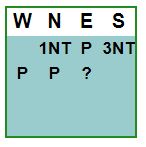
You will
never see Joe Grue tank in this auction. 99% of the time he will pass in tempo. The remaining 1% he will double in tempo. Same goes for any other expert you care to name.
Adopting the tips above will do more than just help you bid in better tempo:
- you will bid more quickly
- you will more often find bids that sidestep a possible awkward rebid problem
- you will be more relaxed
- you will feel more masterful and in control
- you will project a more professional image to others
 RHO tanks for 30 seconds before bidding 4
RHO tanks for 30 seconds before bidding 4 Darn–partner bid spades not hearts or clubs, I’d know what to do then. Now should I rebid 2
Darn–partner bid spades not hearts or clubs, I’d know what to do then. Now should I rebid 2 Your first thought is to open 1
Your first thought is to open 1 What now? Opponents bid 4
What now? Opponents bid 4 You will never see Joe Grue tank in this auction. 99% of the time he will pass in tempo. The remaining 1% he will double in tempo. Same goes for any other expert you care to name.
Adopting the tips above will do more than just help you bid in better tempo:
You will never see Joe Grue tank in this auction. 99% of the time he will pass in tempo. The remaining 1% he will double in tempo. Same goes for any other expert you care to name.
Adopting the tips above will do more than just help you bid in better tempo:

























